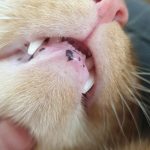If you’re a cat parent, you’ve probably noticed those pesky black spots around your feline friend’s mouth, nose, and eyes at some point. At first glance, they might seem like just another quirky feature of our beloved pets’ faces.
Black Spots Around Cat’s Mouth, Nose, and Eyes: What Do They Mean?
However, these mysterious black spots can be a sign of something more significant than just your cat’s unique charm. In fact, they might indicate underlying health issues that require attention from a veterinarian.
The Importance of Identifying Black Spots
Cats are notorious for hiding signs of illness or discomfort, making it crucial to pay close attention to any changes in their appearance. The black spots around your cat’s mouth, nose, and eyes can be a valuable indicator of potential health problems, including respiratory issues, gastrointestinal concerns, and even certain types of cancer.
As you continue reading, we’ll dive deeper into the possible causes of these enigmatic black spots and what they might mean for your cat’s overall well-being. From identifying the warning signs to taking proactive steps towards maintaining a healthy feline companion, this post aims to empower you with the knowledge necessary to provide the best care for your beloved pet.
If you’re a cat parent, you’ve probably noticed those pesky black spots around your feline friend’s mouth, nose, and eyes at some point. At first glance, they might seem like just another quirky feature of our beloved pets’ faces.
Black Spots Around Cat’s Mouth, Nose, and Eyes: What Do They Mean?
However, these mysterious black spots can be a sign of something more significant than just your cat’s unique charm. In fact, they might indicate underlying health issues that require attention from a veterinarian.
The Importance of Identifying Black Spots
Cats are notorious for hiding signs of illness or discomfort, making it crucial to pay close attention to any changes in their appearance. The black spots around your cat’s mouth, nose, and eyes can be a valuable indicator of potential health problems, including respiratory issues, gastrointestinal concerns, and even certain types of cancer.
So, what exactly are these mysterious black spots? In most cases, they’re caused by the buildup of melanin, a pigment produced by cells called melanocytes. This excess melanin can manifest as dark spots or patches on your cat’s skin and mucous membranes, including around their mouth, nose, and eyes.
However, it’s not always just about melanin. In some cases, these black spots might be a sign of an underlying condition, such as:
- Chronic rhinitis: This inflammatory condition can cause the nasal mucosa to produce excess mucus, leading to the formation of black spots around your cat’s nose.
- Dental issues: Gum disease or tooth decay can cause inflammation and discharge, resulting in dark spots near your cat’s mouth.
- Feline upper respiratory tract infections (URIs): These common infections can cause lesions on the skin and mucous membranes, including around the eyes and nose.
- Kidney disease: In some cases, black spots around your cat’s mouth, nose, and eyes might be a sign of kidney disease, which can cause changes in skin pigmentation.
It’s essential to note that not all black spots are indicative of health issues. Some cats may simply have a genetic predisposition to develop these dark patches as they age. However, if you’re concerned about the appearance of your cat’s black spots or if they’re accompanied by other signs of illness (such as lethargy, loss of appetite, or changes in stool quality), it’s always best to consult with a veterinarian.
As we’ve discussed, identifying and addressing potential health issues early on is crucial for maintaining your cat’s overall well-being. By staying vigilant and paying attention to any changes in their appearance, you can help prevent complications and ensure your feline friend leads a happy, healthy life.
What Can You Do?
If you’re concerned about the black spots around your cat’s mouth, nose, and eyes, there are several steps you can take:
- Contact your veterinarian: Schedule an appointment to have your cat examined and determine the underlying cause of the black spots.
- Keep an eye on changes: Monitor any changes in your cat’s appearance or behavior, and report them to your veterinarian if you notice anything unusual.
- Maintain good oral health: Brush your cat’s teeth regularly and provide a balanced diet to help prevent dental issues.
By working closely with your veterinarian and taking proactive steps towards maintaining your cat’s health, you can help ensure they live a long, happy life – black spots and all!
Learn more about feline health issues Consult with a veterinarian onlineStay tuned for our next installment, where we’ll dive deeper into the world of cat health and explore more fascinating topics!
Consult a Veterinary Expert Today!
Don’t hesitate to reach out if you have any concerns about your cat’s health.
Consult a Veterinarian NowIn conclusion, those seemingly innocuous black spots around your cat’s mouth, nose, and eyes are actually a crucial indicator of potential health issues that require prompt attention from a veterinarian.
By recognizing the warning signs and taking proactive steps to maintain your cat’s overall well-being, you can help ensure they lead a happy, healthy life. Remember, cats often hide signs of illness or discomfort, making it essential to stay vigilant and keep a close eye on any changes in their appearance.
As we’ve explored the possible causes of these enigmatic black spots, it’s clear that they can be a sign of respiratory issues, gastrointestinal concerns, and even certain types of cancer. By staying informed and working closely with your veterinarian, you can help prevent or manage these conditions, giving your cat the best possible chance at a long, healthy life.
So, the next time you notice those black spots around your cat’s mouth, nose, and eyes, don’t brush it off as just another quirky feature. Instead, take it as an opportunity to get ahead of any potential health issues and show your cat that you truly care about their well-being.
Ask a CPA a question online for free: Got financial questions? Get expert advice from certified public accountants (CPAs) without breaking the bank! Our guide reveals how to get your queries answered at no cost.
Can hydrogen peroxide make an ear infection worse?: Are you dealing with ear infections and wondering if hydrogen peroxide is the culprit? Discover the surprising truth about this common remedy and what to do instead for effective treatment.



